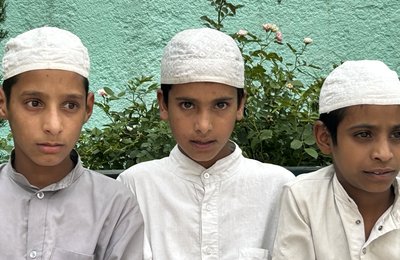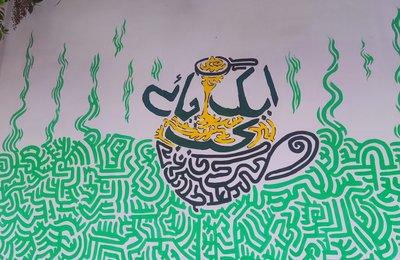What does it take to decolonise partnerships between local peacebuilders and INGOs & funders in the Global North? How can local practitioners shake off the oppression - imposed and internalised - of systemic racism in partnerships with Global North organisations? How can we push back against problematic approaches that entrench racism and neocolonialism?
These are some of the vital questions tackled in Peace Direct's podcast series, The Problem with Partnerships. You can find it on Spotify, Apple Podcasts, or wherever you listen to podcasts.
What went wrong?
For the past few decades, the way that the international development, humanitarian and peacebuilding system works has been changing. Partnerships between organisations in the Global North and South have begun to replace the old, neocolonial model of direct implementation by Global North NGOs in Global South countries.
As described in Peace Direct's Transforming Partnerships guide, "For decades, a model of direct implementation by Global North actors was the dominant approach across much of the international humanitarian, development, and peacebuilding sectors. Communities and CSOs in the Global South were viewed largely as ‘beneficiaries’ of programmes led by the Global North, or – at best – conduits to enable humanitarian, development and peacebuilding efforts to reach particular groups. Nevertheless, the need for effective partnerships between Global North and Global South actors has been recognised for at least twenty years."
Commitments like the 2008 Accra Agenda refer to 'inclusive partnerships', the 2010 Istanbul Principles urge signatories to 'pursue equitable partnerships and solidarity', and the 2016 Grand Bargain compels funders to ‘engage with local and national responders in a spirit of partnership and aim to reinforce rather than replace local and national capacities.’
Yet, we've all seen how little change has occurred. As local organisations keep highlighting to NGOs in the Global North, change is not coming fast enough, and the structural racism and neocolonial attitudes that shaped our sector continue to prevail. Why? Conversations we've had have revealed there are many people in the sector who still don’t see the need to change, there are others who are desperate to do better, but don’t know how – or feel disempowered by the structures they work in, and there are those who haven’t been included in the conversation.
So in 2024, Peace Direct followed up on the Transforming Partnerships guide with The Problem with Partnerships, a new podcast series, to expand the conversation, and drive real action. With nine experts from across the sector and around the world, we dig into the problems our sector faces, and the actions we can all take to transform our work. Each episode comes with recommendations for action listeners to take - whether you're in the Global South or North - to decolonise the system.
We're on Spotify, Apple Podcasts, or wherever you listen to podcasts.
Back to basics
In the first three episodes, we dug in to some of the issues we've been hearing about for years, but which we know some power-holders in our sector have not truly sat with and responded to.
In the first episode, we looked inwards, and went back to basics, with Peace Direct's CEO Dylan Mathews, our Senior Learning and Impact Advisor Ruby Quantson Davis, and Dr Prince Charles Dickson, a long-term colleague of Peace Direct and the team lead for the Nigerian-based Tattaaunawa Roundtable Initiative (TRICentre). Together with host Raaval Singh Bains, Research Officer on secondment to decolonise Peace Direct, our guests touched on some of the ways structural racism shows up in this sector, and explored Peace Direct's own journey, through research and internal reflection, to seek ways to decolonise.
In episode 2, we explored what it means to have internalised the racism that shaped international development, humanitarianism and peacebuilding for centuries. Experts Gunjan Veda and Chernor Bah examined how individuals in the Global North might be perpetuating racist narratives without realising, and reflected on the impact of internalised oppression on generations in the Global South. They explored ways this oppression can be shaken off.
In episode 3, Nicoline Nwenushi Wazeh led discussion on the practical ways that racism and neocolonialism affect local organisations trying to build peace, or do other impactful work, in their communities. She was joined by Gunjan Veda and Dr Véronique Barbelet as we covered the vital importance of trust and respect - foundational values of true, equitable partnerships - and how the absence of these values not only undermines the very goals we are trying to achieve together, but puts local practitioners in danger.
Extending the conversation
In episodes 4 and 5, we explored two topics that haven't had as much attention: inclusivity, and intentionality.
Episode 4, "Nothing about us without us", took a deep dive into inclusivity — what it really means, and how it plays out in global spaces, including conversations about decolonisation, where voices from the Global South and marginalised communities are often sidelined. Guests Gunjan Veda, Dr Véronique Barbelet, Dr Jamie Hagen, and Ishani Ida Cordeiro each tackled different forms of inclusion or accessibility, identifying the continuing gaps in our sector's approach to power-sharing and accessibility.
In episode 5, we delve into the challenges slowing down decolonisation of the international development system. Gunjan Veda, Dr Véronique Barbelet, Ishani Ida Cordeiro and Chernor Bah emphasise the limitations of good intentions and discuss the complexity of shifting power dynamics to foster genuine partnerships based on respect and dignity. We explore pressing questions - what makes decolonisation so difficult for the humanitarian, development and peacebuilding system? Why is change taking so long?
What is a decolonised partnership?
In the final episode, all of the guests from the series shared their interpretation of a decolonised partnership, including wondering if it's even possible to achieve. We were also joined by Jennifer Pobi-Browne, an International Programmes Manager at Peace Direct, who explained the different ways Peace Direct is assessing and seeking to improve our own partnerships with our local partners around the world.
Discover some of the answers to this question in the trailer:
As Raaval highlights at the end of the series, decolonising our own corner of the world alone is a lot harder than working together. Connect with your peers, talk about it with your friends, and get in touch with Peace Direct – we would love to hear about the changes you’re making, the challenges you’re encountering, and the hopes you have for our sector’s future.
We hope you'll listen to the series, and share your perspective on decolonised partnerships on social media or via the podcast's comments and reviews, using the hashtag #TransformPartnerships.

Time to Decolonise Aid
Structural racism reinforces colonial dynamics in global development, according to our new report.









